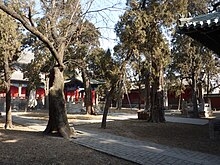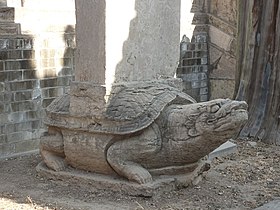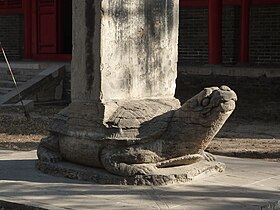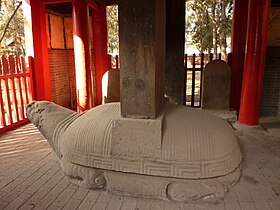35°36′3″N 116°59′19″E / 35.60083°N 116.98861°E

The Temple of Yan Hui, commonly known as simply the Temple of Yan or Yan Temple (Chinese: 颜庙; pinyin: Yán miào), is a temple in Qufu, Jining, Shandong, China, dedicated to Yan Hui (521-490 BC), the favorite disciple of Confucius.[1]
Location and layout

The temple is located within the historic walled city of Qufu, the hometown of both Confucius and Yan Hui, in modern Shandong Province. The temple is just south of the northern gates of the city wall, and is few blocks to the north of the Temple of Confucius (which is located north of the city wall's southern gates).[2]
The temple's premises are a rectangle, 254.50 m long (from the north to the south) and 109.80 m wide (from the east to the west). According to local historians, there are 148 architectural and sculptural objects (halls, pavilions, gates, steles) on the temple's premises, as well as 369 valuable old trees.[2]
Gallery
-
A gateway
-
The sanctuary (Hall of Fusheng)
-
Edict of Temür Khan granting protection to the temple, in Chinese and Mongol ('Phags-pa script). Dade 11 (1307)
-
Bilingual stele granting Yan Hui the title of Fusheng (Continuator of the Sage), Duke of Yanguo. Zhishun 2 (1331)
-
Stele in memory of rebuilding the temple. Zhizheng 9 (1349)
-
Stele in memory of rebuilding the temple. Zhengtong 6 (1441)
-
Stele in memory of rebuilding the temple. Zhengde 4 (1509)
See also
- Temple of Confucius, Qufu
- Temple of Mencius 孟廟
- Temple of Zengzi 曾廟
Notes
- ^ Confucius & Slingerland 2003, p. 11
- ^ a b Kong Fanyin (2002), pp. 284-294
References
- Confucius; Slingerland, Edward Gilman (2003), Confucius analects: with selections from traditional commentaries, Hackett Publishing, ISBN 0-87220-635-1
- 孔繁银 (Kong Fanyin) (2002), 曲阜的历史名人与文物 (Famous people and cultural relics of Qufu's history), 齐鲁书社 (Jinlu Shushe), ISBN 7-5333-0981-2
















